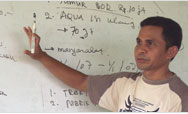You are here » Home » Telling Our Story
Case Study
Amid significant loss, firm is trained to adapt to expanded market.
Moldovan Winery Revamps Its Style

Photo: Doina Nistor Chemonics Int
"USAID consultant Luca Zavarise (center) monitors the improvement in wine quality at
Salcuta Winery. By adopting new wine styles, the Winery was able to expand its market at
a critical moment."
“By investing in better wine quality today, we strive for a better future,” said Sergiu Paslaru, general director for Salcuta Winery.
Challenge
When a bilateral trade dispute resulted in a Russian ban on Moldovan wine imports, Salcuta Winery, like most Moldovan wineries, was devastated. Historically, Russia has been Moldova’s principal wine market, accounting for over 80% of total exports. Sending many of its employees on unpaid leave, Salcuta Winery quickly had to find a way to save its business. As company officials began pursuing alternative markets, they realized that in order to be competitive outside of Russia, they needed to improve the company’s winemaking skills and adopt fresh wine styles similar to the younger, fruitier wines of Australia, California, and Chile.
Initiative
Since 2005, USAID has been working closely with the Moldovan wine industry to access new markets, modernize its styles and improve its marketing and branding. When the Russian ban was implemented, USAID secured an international winemaker familiar with the challenges facing the Moldovan wine sector to assist Salcuta. Winery staff received hands-on training in the latest developments in winemaking. Employees were taught how to properly set up the winery’s equipment for collecting and crushing grapes, introduced changes to the fermentation process, and advised on the treatment and storage of the wines. With these changes, Salcuta was able to produce new wine styles.
Results
Salcuta’s new wines are now selling in Poland under its new “Noi” brand. To date, Salcuta has shipped two containers of “Noi” to Poland, and two more are planned. The new wines sales account for 20% of Salcuta’s total sales, and negotiations with potential buyers from Romania and Germany are in progress. With USAID assistance, Salcuta Winery took an important step towards diversifying its market by producing high-quality wines that adhere to internationally recognized standards. Most importantly, Salcuta sustained its operations, saving approximately 100 jobs, and now serves as model for other Moldovan wineries.
Print-friendly version of this page (533kb - PDF)
Click here for high-res photo
Back to Top ^ | 

